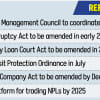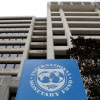IMF prescribes ending tax exemptions
The International Monetary Fund (IMF) has prescribed that Bangladesh must abolish VAT and income tax exemptions in various areas in order to accelerate revenue collections from the next fiscal year.
It recommended the National Board of Revenue (NBR) discontinue the tax holiday for the information and communication technology industry and abolish the tax benefit for mining and petroleum extracting companies.
The multilateral agency also proposed imposition of a 15 percent VAT on all businesses with over Tk 3 crore annual turnover and offering them input tax credits. It suggested elimination of truncated VAT rates to accelerate overall revenue collection.
The recommendations were made by the visiting mission of the IMF during a meeting with the NBR at the latter's headquarters in Dhaka.
The delegation is in the capital to review the progress of the $4.7 billion loan programme before releasing around $681 million in the third tranche in May to help the country overcome severe economic challenges.
The team is meeting officials of the finance division, the Bangladesh Bank, the NBR and other government bodies.
Bangladesh's revenue as a share of GDP is among the lowest in the world and significantly below peers. This has significantly limited the fiscal space necessary for critical public investments and social sector spending.
As part of the conditions attached with the IMF loan approved in January last year, the NBR will have to collect Tk 394,530 crore in the current fiscal year ending in June. Until March, the tax collector raised Tk 259,866 crore, posting a 15 percent year-on-year growth.
In a presentation, the NBR's income tax wing projected to collect Tk 15,300 crore in tax in 2024-25 through policy measures, including enforcing tax compliance and limiting tax expenditures such as exemptions and rebates.
The IMF suggested the NBR scrap the VAT exemptions for clothing and footwear, liquefied petroleum gas (LPG), and mobile phone manufacturing.
At present, customers pay 7.5 percent VAT on clothing. However, they do not need to pay any VAT for sandals priced below Tk 150 a pair.
The existing VAT on LPG cylinders is 5 percent, and locally manufactured mobile phones are subject to a 2 percent to 7.5 percent VAT.
The IMF wants the NBR to replace these reduced rates with a 15 percent VAT.
If the tax administration ends the tax expenditures on clothing, footwear, LPG, mobile phones, and other products, it would provide additional taxes that are equivalent to 0.31 percent of gross domestic product (GDP), according to an estimate by the IMF presented at the meeting.
An NBR official said they would implement IMF's recommendations gradually since any abrupt move would affect domestic trade and industries.
"We must take into account the country's socio-economic situation before withdrawing tax exemptions fully."
The IMF urged the VAT wing to submit the VAT exemption report and the medium and long-term revenue strategy by June. It wants the NBR to move away from multiple VAT rates and impose a 15 percent standard rate.
The official, however, said multiple VAT rates exist in many countries, including those in the European Union.
"If they can have multiple VAT rates, why can't Bangladesh have the same? We are not avoiding the global best practices."
The Washington-based lender recommended advancing short and medium-term reforms in the next budget and called for fresh measures that would fetch revenues worth 0.5 percent of GDP in FY25.
It set new structural benchmarks for the NBR and suggested the revenue administration finalise a medium- and long-term revenue strategy covering indirect and direct taxes and an accompanying implementation framework by September this year.
The IMF called for rolling out e-return filing and the online payments facility for large corporations and companies that claim tax preferences such as exemptions, lower rates, or a tax holiday.

 For all latest news, follow The Daily Star's Google News channel.
For all latest news, follow The Daily Star's Google News channel. 









Comments